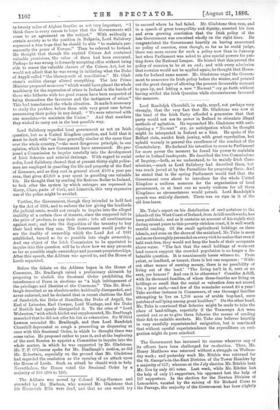Lord Randolph Churchill, in reply, urged, not perhaps very strongly,
that the very fact that Mr. Gladstone was now at the head of the Irish Party afforded a guarantee that that party would not use its power in Ireland to stimulate illegal methods of agitation. He 'reproached Mr. Gladstone with anti- cipating a " No-rent " cry, an anticipation which he thought might be interpreted in Ireland as a hint. He spoke of the Belfast riots, amidst Irish jeering, with great reprobation, but upheld warmly in general the excellence of the conduct of the Constabulary. He declared his intention to come to Parliament for more power the moment he found his power to maintain order in Ireland inadequate. He described the two Commissions of Inquiry,—both, as we understand, to be mainly Irish Cora- missions,—much as Lord Salisbury had described them, bat was much jeered at by the Parnellites for proposing them. And he stated that in the spring Parliament would find that the Goverement were about to introduce for the whole United Kingdom a uniform measure for the organisation of local government, or at least one as nearly uniform for all three Kingdoms as circumstances would permit. Lord Randolph's speech was entirely discreet. There was no sign in it of the old free-lance.


































 Previous page
Previous page